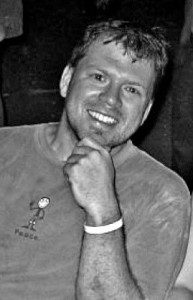 Guest Post by the Rev. Brandon Gilvin
Guest Post by the Rev. Brandon Gilvin
“The Christian life is a continual process of death and resurrection … When I trip over something I think I know … or God disrupts what I think I know … if I choose to stay in community, then I see God’s grace fill in cracks of all our brokenness.”
–Nadia Bolz-Weber
“Fiction is the privileged path for the redescription of reality.”
–Paul Ricoeur
Mark 5:41
She was the second child baptized in that swimming pool, right after her twin brother. She had secretly wondered if she could use the slide before being dunked.
“Our church is our home, and our home is our church,” her papaw would always say.
Years later, over a beer, her friends would ask her if it was weird.
“Not really,” she would say. ”I mean…I had an Ipod and everything, just like everyone else at school. Not everyone would get to be on TV, like we were, but it was what I knew. It was my family. Isn’t that where we first learn what normal is?”
“Yeah, but do little kids carrying ‘God Hates Queers’ signs ever count as normal? When did you figure out it wasn’t? At some point, didn’t you just know? You grew up in a cult.”
There was always some version of that question, eventually. When you don’t have a place to go for the holidays, when people start swapping stories about growing up, when people remark that you look a little familiar.
“Yeah, I was on CNN a couple of times.”
YouTube proves it. The dumbfounded TV Reporter asking why anyone would say that God hates anyone when God is supposed to be a God of love.
Her voice. A younger version of her voice, at least, replying. “He loves them with his perfect hate. God hates queers. That’s what the Bible says.”
It was hard, the day she left. It took years to gather her courage. She thought about the sweet songs papaw would sing her, and how she would never sing them again. There were cousins who just disappeared, never to be heard from. Her mom hadn’t even mentioned her brother’s name for two years, since he snuck away. She felt, not unlike he did, that there was something not right about this home. This church. This family. This life.
She unlatched the fence, looked back, and caught a quick glimpse of the slide. It was mid-afternoon, and though her worry had kept her up all night, when she stepped out of the yard, she felt as though she was just waking up.
Mark 9:27
Lyndon Baines Johnson was president when his parents came to the United States, so that’s what they named him. These days, it’s easier for people to just call him LBJ. He was 22 when the voices started; it was like they came from deep inside him and far away, out of nowhere, at the same time. The meds helped with the voices, but he felt even less like himself when he was on them. He would wander the streets, speaking to the voices he heard, looking for somewhere to be, getting along as best he could. His parents died when he was in his thirties. And so he wandered.
John and Mandy took in LBJ after he wandered into their church one evening. He became family to them. He taught them how to make Ugali. They taught him how to tolerate tofu. They helped LBJ with his money, helped keep him on his meds as best they could. He would sometimes save up enough for a bus ticket and wander somewhere.
“On Vacation,” LBJ would tell John and Mandy upon his return. He always returned. Sometimes the voices returned with him.
Though there were disagreements about his wandering, about how much of his disability check he could control, Mandy and John held firm on one point with LBJ: Their home was his home. They never wavered. He was more than welcome; he was family.
The young couple had children—a boy and a girl, and LBJ was their family, too. He loved to read them stories, to pull them in a wagon, to watch them grow. It was one of the best parts of his life.
But this is not about LBJ being healed.
It is about how, on a sweet Summer night, the kind that no one wants to end, while LBJ was on a four-month vacation, the rest of the family stood outside, talking to some neighbors about an issue involving homelessness.
When the neighbors spoke, they had several things to declare. “Those homeless are all drunks” and “You know the homeless are thieves; it’s part of the package.”
Taylor, John and Mandy’s youngest, calmly interrupted them.
“LBJ’s not like that; he’s a really nice guy,” the child said. “He just has a few problems. But he’d never steal.”
Sometimes the healing is in the becoming.
Mark 16:6b
It was his 29th birthday and his mother made a cake. Angel food. His favorite.
She breathed in. The air felt heavy. Her chest felt heavy.
The world felt heavy.
It had been so long since she had seen him. She liked to remember him as he was in high school, half lithe, half lanky as he dribbled down the court. Before the knee injury. Before the long, long recovery. Before the damned Oxy that he could just never quit. Before everything else that followed.
Before he was arrested. Released. Arrested. Released.
Before he was clean for a while, then not.
Before he would disappear for weeks. Then months.
Before the last time he was arrested, convicted, sentenced.
Before parole.
She knew prison had been hard on him. God knows it hadn’t been easy on her. But at least she knew where he was.
“I was so thankful every day he was in jail,” she would say. “Because I knew where he was. He wasn’t dead in some tomb of a drug house.
“And now he is home,” she said to herself, as she exhaled. “This is where he lays his head now. He is not there, wherever ‘there’ is or was or might’ve been.”
“He is alive. ”
Rev. Brandon Gilvin is the Associate Director of Week of Compassion. A native Kentuckian, he now lives in Kansas City with his wife, Lisa.












